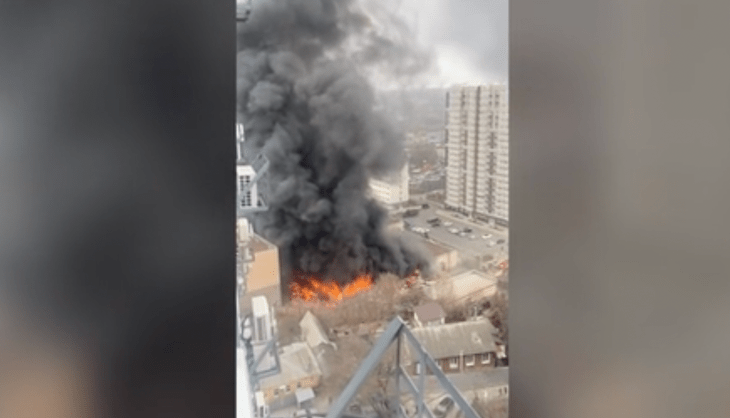Few people in Rostov-on-Don will weep over the news that a local FSB building in the city caught fire yesterday. Just the mention of the acronym for the Security Services (formerly KGB) was, when I lived there, enough to still and silence a room.
When a girl in one of my classes announced rather proudly that her boyfriend worked for the service, there was a ripple of discomfort in the room and, subsequently, fellow students once expansive got notably more guarded. At a local pipe club I attended, one of the members worked for them too, a well-built man with brushed back hair, a Stalin moustache, and a set – unlike the rest of us – of the most expensive Dunhill pipes (a decent income is just one of the job’s advantages). Everyone at the club deferred to him. Disagreeing with him one day about an out-of-favour Russian novelist, I got eyeballed with panic by a fellow guest, who mouthed at me, when the man turned away, that I should ‘just keep my mouth shut’.
Rostov-on-Don, a mere 130 miles from Lugansk, was always going to be vulnerable in this war
Small wonder then that the service consider themselves a quasi-aristocracy in Russia 2023, or that the novelist Vladimir Sorokin viewed them in his Day of the Oprichnik as modern-day, Mercedes-driving descendants of Ivan the Terrible’s brutal cohorts. Yet, as shown by yesterday’s fire – which has thus far produced at least three fatalities – they are not infallible.
It’s been claimed by Vassily Golubev, Rostov’s governor, that the explosion and fire were accidents, the result of a short-circuit igniting fuel tanks on the property. Despite Ukrainian Presidential aide Mykhaylo Podolyak’s tweet that the fire was a ‘manifestation of panic’ in Russia, and that Ukraine, though uninvolved, was ‘watching with pleasure’, this seems just about plausible and certainly not out of tune with Rostov’s past.
The city has always been accident prone, a place where catastrophe struck so often it ceased to come as much surprise. The serial killer and cannibal Andrei Chikatilo, who before his execution in 1994 was convicted of killing and mutilating 52 women and children, used Rostov as his main field of operations (indeed, the parks where he abducted children are barely avoidable if you have kids there of your own). In 2016, torrential floods gutted shops in the city’s underpasses and one woman drowned. In the same year, a Boeing 737 from Dubai crashed at Rostov airport, killing all 62 passengers. Two died, a year later, after a ten-storey hotel bang in the centre of town caught fire. The fire yesterday may have surprised many – the FSB are supposed to be invincible, after all – yet it it is to a great extent, for this city on the Don, business as usual.
Is Golubev to be believed, or has Podolyak hit on something? There have been numerous arson attacks on state buildings since war broke out in February 2022, though few as audacious as this one may be. As early as February last year, a conscription office was set alight in Moscow, and there have been countless attacks – usually with Molotov Cocktails – on such buildings since. In Irkutsk Region, Siberia, after September’s mobilization, a young man shot a recruiting officer at point-blank range, and as of early March, there have been ten documented arson attacks, from Krasnodar to Murmansk, this year alone.
Rostov-on-Don, a mere 130 miles from Lugansk, was always going to be vulnerable in this war. Soldiers drafted from there to fight in Donbass are not travelling to far-off places but to a region a few hours from their homes and families. This of course is not proof of foul play – yet the question it raises is not why the fire took place in Rostov-on-Don yesterday, but why such things have not happened there before.
Rumours were flying round the city last night about the fire’s provenance, yet one can expect Rostovites to react phlegmatically with their refusal to be shocked by whatever life throws at them. Given though that the victim yesterday was the much-feared FSB, one can expect the inevitable jokes – shared privately, in kitchens and hushed voices – to have been black as the smoke still hanging over the city.






Comments